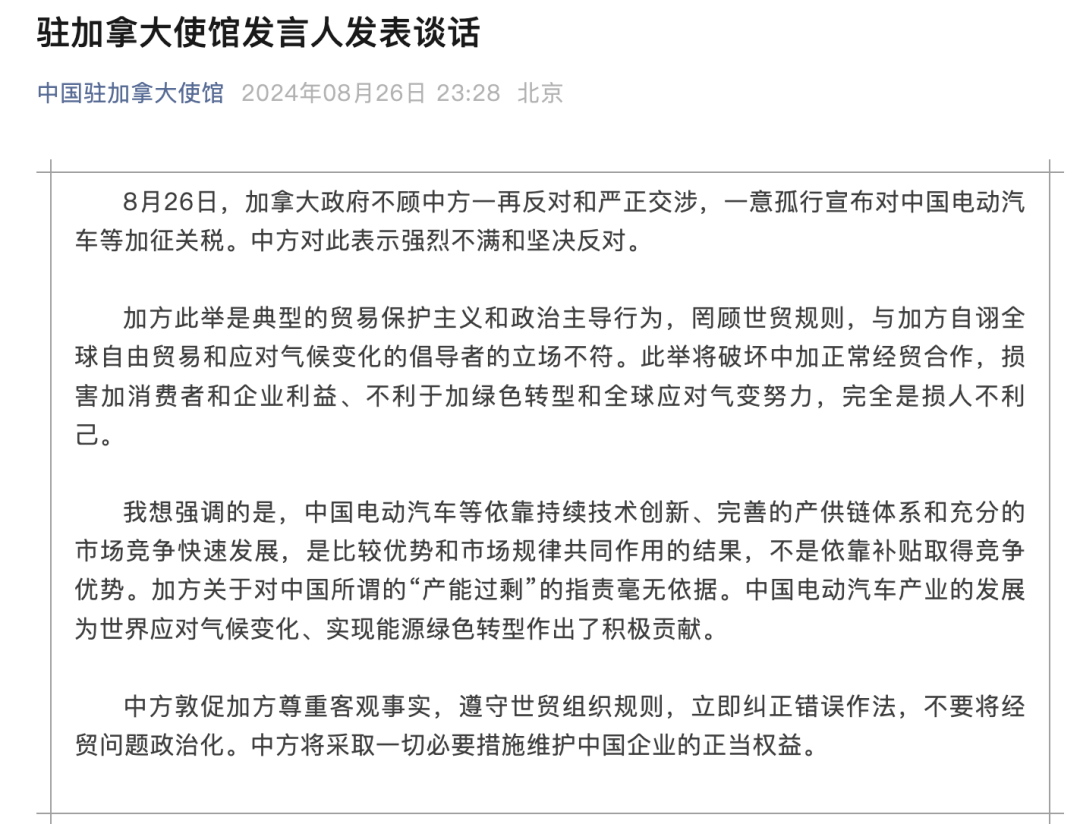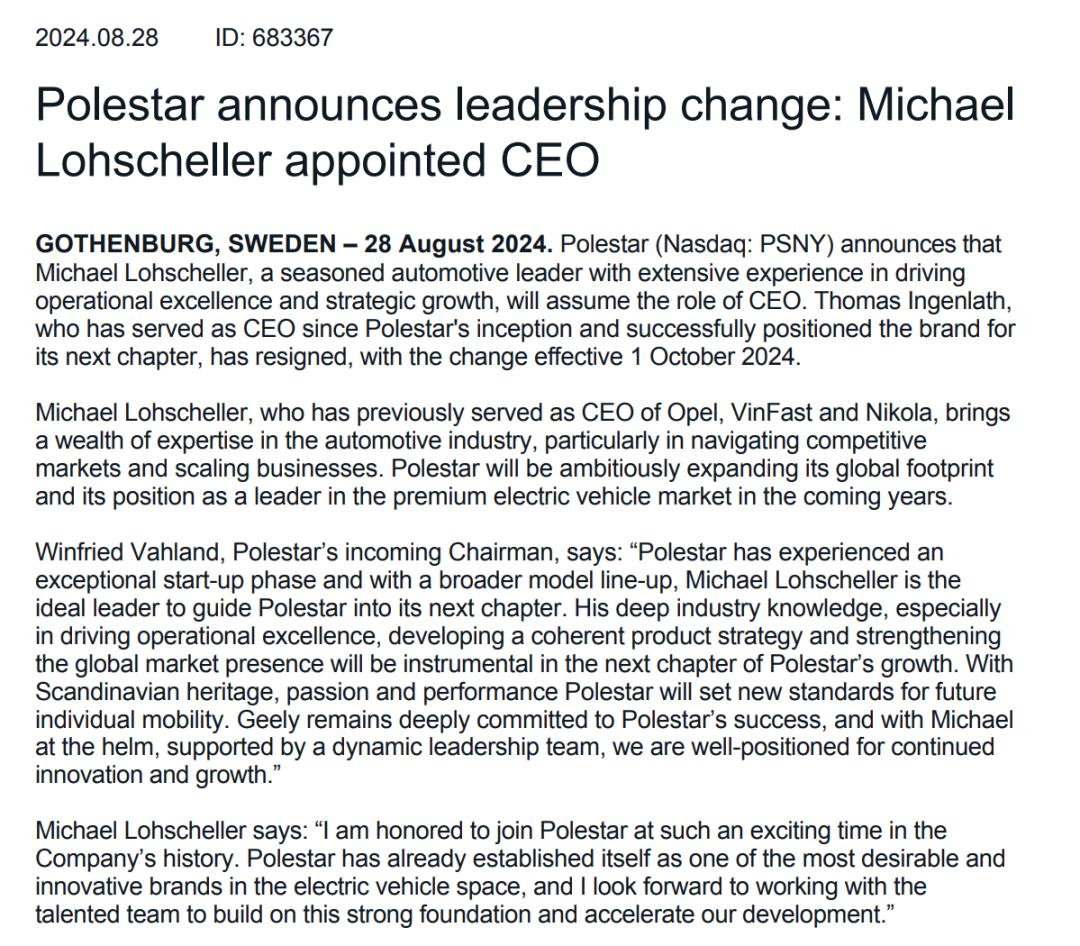On August 26, Canadian Prime Minister Justin Trudeau announced the policy details in Halifax, declaring that a 100% tariff would be imposed on electric vehicles from China starting from October 1, 2024. It is worth noting that the objects of the tariff increase not only include pure electric vehicles but also plug-in hybrid passenger vehicles, petrol-electric hybrid vehicles, fuel cell vehicles, covering various types such as passenger cars, trucks, buses and vans. It is understood that the current tariff rate for Chinese electric vehicles in Canada is 6.1%, and the new tariff will be imposed on this basis. That night, the official statement of the Chinese Embassy in Canada responded that the Canadian government, disregarding China’s repeated opposition and solemn representations, obstinately announced the imposition of tariffs on Chinese electric vehicles. China expresses its strong dissatisfaction and firm opposition to this. This move by the Canadian side is a typical act of trade protectionism and political dominance, disregarding WTO rules and inconsistent with Canada’s self-proclaimed position as an advocate of global free trade and response to climate change. This move will undermine normal economic and trade cooperation between China and Canada, harm the interests of Canadian consumers and enterprises, be detrimental to Canada’s green transformation and global efforts to address climate change, and is completely detrimental to others without benefiting oneself. China urges the Canadian side to respect objective facts, abide by WTO rules, immediately correct the wrong practice, and not politicize economic and trade issues. China will take all necessary measures to safeguard the legitimate rights and interests of Chinese enterprises. This move by Canada comes after the United States and the European Union imposed tariffs. In May this year, the White House of the United States issued a statement that it will significantly increase tariffs on a series of Chinese imported products including electric vehicles. Among them, the tariff rate on electric vehicles from China will be raised from 25% to 100%. If the 2.5% basic tariff imposed by the United States on electric vehicles is included, the final tariff rate will reach 102.5%. In addition, the tariff rate on lithium batteries for electric vehicles will be raised from 7.5% to 25%, and the tariff rate on battery components will be raised from 7.5% to 25%. In August, the European Commission disclosed to the relevant parties the draft decision to impose the final countervailing duty on pure electric vehicles imported from China. Among them, BYD, Geely Automobile, and SAIC Motor will be imposed tariffs of 17.0%, 19.3%, and 36.3% respectively, other cooperative companies will be imposed 21.3%, and other non-cooperative companies will be imposed 36.3%. Tesla, as a Chinese exporter, implements a separate tariff rate, which is only 9% at the current stage. Canada plans to impose tariffs on Chinese electric vehicles, but in fact, it will not hinder the globalization process of China’s electric vehicle industry chain and has a relatively small impact on Chinese independent brands. Currently, Chinese-made electric vehicles exported to Canada mainly come from Tesla’s Shanghai factory. As an American company, Tesla can supply to Canada through its factories in the United States or Germany, thereby avoiding tariffs. As for other Chinese brands, the number of electric vehicles exported to Canada at the current stage is very few. However, there were recent reports that BYD plans to enter the Canadian market and has met with Canadian dealers to discuss the opening of dealerships. Therefore, Canada’s imposition of tariffs is more like a preventive measure and will largely prevent Chinese-made electric vehicles from entering Canada. Both the US government and the Canadian government claim that China’s policy of dominant overcapacity and oversupply will weaken the automotive industry and believe that China gains an unfair competitive advantage through subsidies. Previously, the Chinese Consulate General in Toronto issued a statement refuting the “overcapacity theory” as a false proposition. The official said that all countries produce and export products with their comparative advantages. 80% of the cars produced by Germany, 50% of those by Japan, and 25% of those by the United States are for export, while only 12.7% of the new energy vehicles produced by China are for export, accounting for only 8% of global sales. At the same time, the average selling price of Chinese electric vehicles in Europe is higher than that in China, and there is no “low-price dumping”. Criticizing China with the so-called “overcapacity theory” is a typical double standard. From China’s perspective, at present and in the coming period, Chinese electric vehicles mainly serve the domestic market, and considering all aspects, the demand for new energy vehicles from Chinese consumers will continue to rise in the future. Bloomberg’s comprehensive industry data analysis shows that the inventory of Chinese car dealers is not high, and the conclusion of “overcapacity” cannot be drawn. Facing such high tariffs, it is very difficult for China to export to Canada, but it can enter by building factories overseas and producing electric vehicles in other regions. In fact, many Chinese car companies are actively laying out overseas factory construction. In North America, Mexico has become the choice for some Chinese car companies. Not long ago, SAIC MG announced that it plans to establish a manufacturing plant and a research and development center in Mexico, making Mexico a market hub in Latin America. However, there are also some uncertainties. Previously, US presidential candidate Trump said that if he could return to the White House, he would impose new tariffs to prevent China and other automakers from exporting cars from Mexico to the United States. These undoubtedly add more obstacles to the North American path of Chinese car companies.
Another country joins! Imposes a 100% tariff on Chinese electric vehicles

